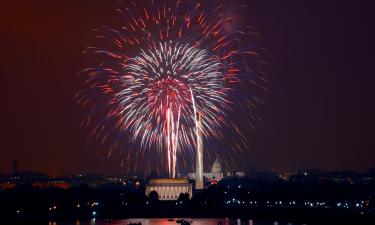Argentina celebrates 20 years of democracy
 On December 20 1983, the then-elected President Raul Alfonsin inaugurated 20 consecutive years of freedom and democratic ruling. Since then the South American had: eight presidents, 15 ministers of Economy, two debt defaults and tens of austerity programs that left more than 50% of the population living in poverty.
On December 20 1983, the then-elected President Raul Alfonsin inaugurated 20 consecutive years of freedom and democratic ruling. Since then the South American had: eight presidents, 15 ministers of Economy, two debt defaults and tens of austerity programs that left more than 50% of the population living in poverty.
Quoting paragraphs of the National Constitution on his speeches, a 56 year-old lawyer called Raul Alfonsin, inaugurated in December 1983 two decades of democracy in Argentina, a country used to systematic military coups since 1930. Since then, the South American country recovered its social and civic freedoms abolished by the Juntas regime of the seventies, but has not resolved a number of outstanding social issues as poverty, inequality and unemployment.
Argentineans welcome democracy as a social value (almost 80% did it in a recent opinion poll), but still claim for pending issues: a country that produces food to feed 300 million people is hammered by more that 50% of its population living in poverty. Also, inequality became an endemic problem for the society: in 1952, workers obtained 50% of nation's income; today less than 18%. In 1989, when Alfonsin's successor, Carlos Menem, took over, the foreign debt was of US$ 46 billion; next year will reach US$ 185 billion in default.
By 1989, Argentina's State owned an oil company with investments in Asia, America and Middle East (YPF); the telecommunications national company; an airline that flew to four continents; a merchant marine; the national mail, etc., etc. After the privatization process of the nineties, there is nothing left.
The initial steps
The key person that secured the transition process from a bloody dictatorship to a plural democratic society is Raul Alfonsin. Alfonsin ruled the country between December 1983 and June 1989. He is now 76 and still a prominent member of the centrist Radical Party. Alfonsin president of the Socialist International for Latin America and vice-president of this political organization gained world's attention when pushed ahead the trial of the juntas that ruled Argentina between 1976 and 1983, responsible for 30,000 "disappeared" people. There is no precedent of such action in any country ever, even taking into account Nuremberg Trials against prominent Nazi officials.
"I admire (Italian former minister of Justice and secretary general of the Communist Party, Palmiro) Togliatti but released the fascists; (French president Francoise) Miterrand did the same. I don't blame on them", said Alfonsin to the foreign media. Perhaps, Alfonsin decision to try former Argentine Army criminals will save him a place in world's history. Unfortunately, his last years in power were not as splendid: harassed by right-wing fueled military uprisings and leftist insurrections, he had to prematurely deliver power to the elected peronist leader Carlos Menem. Menem, together with one of his closer collaborators, Domingo Cavallo (two times minister of Economy), had plotted a "market putsch" that triggered an hyperinflation process that forced Alfonsin to resign.
"Cavallo destroyed the country by pushing a three points program that pegged the local currency to the US Dollar, cut out tariffs andprivatized the pension fund system", takes revenge Alfonsin on his political foe self-exiled in New York. When asked about the pending issues of Latin American democracies, the old Social-Democrat leader does not doubt: "Poverty, social inequality and education". "We have to fight against neo-conservative policies that conspire against democracy", he says.
Many compare Alfonsin first years in power, with the current process led by president Nestor Kirchner. Alfonsin began his mandate with a strong support from the population. He prosecuted the military officers that tortured and killed thousands of Argentineans. At that time the local society trusted and supported his leader despite the opposition of the large financial groups, big industrials, the military and the always reactionary Catholic Church. A similar scenario can be seen in today's Argentina: Kirchner is supported by most of the Argentineans (85% according to the last polls), but resisted by country's traditional powers.
"Right-wing forces are quite strong in Argentina", says Alfonsin as remembers those times. "Middle class are even more conservative than the upper classes", says the political leader that dialogued with Gorbachev and Castro in the eighties to speed up democratic transitions in all Latin America.
In 1987, Alfonsin was forced to setback and made the Congress to pass amnesty laws that freed hundreds of low ranked officers, whose crimes remained unpunished. Such laws were overturned by the current administration of Nestor Kirchner and some of the released criminals were sent back to jail.
Since then, Alfonsin lost support from the population, and the chronic economical crisis sparked union's protests, led by the center-right Peronist Party. Radicals lost parliamentary elections in 1987 and crisis deepened.
Ten years of pro-market programs
Peronist politician Carlos Menem ruled Argentina all along the nineties, with a conservative pro-market policy. Honoring the spirit of the nineties, Menem privatized all the way, as tied country's currency to the Us Dollar. As a result, unemployment hit nation's record, foreign debt went haywire, poverty increased from 20 percent in 1989 to 56 percent in 2001 and inequality opened a huge gap between the poor and the rich.
Menem's administration was signaled by corruption scandals, ranging from illegal sales of weaponry to Croatia and Ecuador while the United Nations blocked both countries, to bribing cases connected to drug trafficking.
In 1999, Fernando De la Rua succeeded Menem, but people's enthusiasm was short: only two years later he was ousted by a popular rebellion in Buenos Aires and country's main cities, as the financial system collapsed after four years of recession. Then came five presidents in ten days, before Eduardo Duhalde provisionally took office until a new president was elected.
Today, Nestor Kirchner rules a country devastated by the economical crisis, but fighting for its recovery. It is a difficult task, but the population learned that defects of democracy can only be solved with more democracy.
Hernan Etchaleco,
Pravda.Ru
Subscribe to Pravda.Ru Telegram channel, Facebook, RSS!




